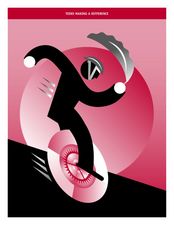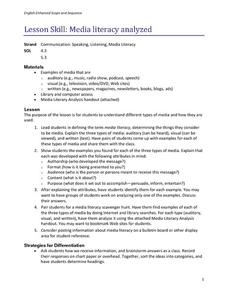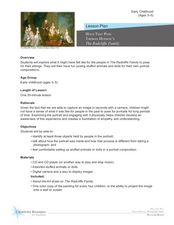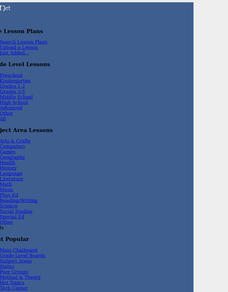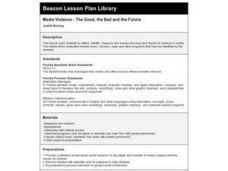Curated OER
Learning to Resist: Watercolor
Consider wax resist drawings as a way to bridge art and science. Learners view, discuss, and practice drawing insects or animals using waxy crayons. They pay attention to the creature's features as they create images with watercolor and...
Japan Society
Akutagawa Ryunosuke and the Taisho Modernists
Japan's Taisho Period was a time when authors like Akutagawa and other Japanese modernists began to experiment with point of view and literary form, making the literature produced during this time period a natural choice for teaching...
Curated OER
Thumbs Up For Movie Reviews
If your class loves movies, this lesson is sure to interest them. After discussing the purpose and structure of movie reviews, young writers compose a movie review and discuss why people may read a review before they go see a film. The...
Curated OER
Day and Night
Good Night, Moon is a classic little ones absolutely love. It's a sweet book that can be used, as in this lesson plan, to start a conversation about the difference between night and day. After reading the story, the class brainstorms...
Curated OER
Teens Making a Difference
Is your opinion significant? Help your class discover the influence their opinions hold and encourage them to make a positive change in their community. To start, they get in teams and brainstorm why their school should have more healthy...
Curated OER
Yoga Ball Bash
This line dance lesson involves the use of PE equipment. If you have yoga balls and rhythm sticks then take a look at this lesson. Of course there are other things that could be used instead of yoga balls. This is a 48-count dance...
Curated OER
Categorizing Objects
Kindergartners practice the important skill of placing things in their correct categories. They must discern between items of clothing and items of food. The use of the Inspiration 7 educational software is effectively used in this...
Curated OER
Media Literacy Analyzed
Fourth and fifth graders define the term media literacy, then come up with examples that they share with the class. The types of media studied are auditory, visual, and written. Learners get together in pairs and perform a media...
Curated OER
Voice of History
Way before the digital age radio was the medium of popular culture. After listening to excerpts from radio programs (easily available on the Internet), participants return to the radio age by creating a two-minute sketch based on a...
Friends of Fort McHenry
Sensory “Star Spangled Banner”
Music can help us to access memories and events in a meaningful way, and Francis Scott Key used specific words to convey what he had seen and felt when writing what would become America's national anthem. Help your class connect to the...
Curated OER
Fun With Chicka Chicka Boom Boom
Students read the book Chicka Chicka Boom Boom and listen to the musical tape. Then they make their own coconut trees, adding their own letters. They express and record their favorite parts. All are displayed on a bulletin board.
Curated OER
Dancing Fast, Medium and Slow
Second graders practice dance using different speeds of music and types of movement. In this dance lesson, 2nd graders view a clip of tap dancing and analyze the speed of music in coordinating with the speed of dance movements. Students...
Curated OER
Ceremonies
Second graders describe Aboriginal ceremonies. In this ceremonies lesson, 2nd graders interview elders from local Aboriginal tribes. Students view ceremonies performed by the elders and research local ceremonies.
Hawaiʻi State Department of Education
Ostinato
Quarter notes, eighth notes, and rests; it's time to read rhythmic patterns in music. The class plays ostinatos as they practice identifying rhythmic patterns. They then listen to Mannheim Steamroller as they draw geometric patterns that...
Curated OER
Hold That Pose
Students discuss the painting The Radcliffe Family and discuss what it was like for them to hold poses for portraits. In this portrait lesson plan, students then pose stuffed animals and make their own portraits.
Curated OER
Moving and Grooving with Tempo
First graders recognize the variations of tempo in music as it changes. They repeat movements, define tempo and distinguish between fast and slow tempo while playing a teacher led game.
Curated OER
Locational Writing
Students go outside to the playground and write a piece in the style of beat poets based on what they see and hear outside.
Curated OER
The Star-Spangled Banner
Get your kids moving as they learn about the history of the United States National Anthem. Scholars examine the War of 1812, Francis Scott Key, and the meaning behind The Star Spangled Banner as they listen to an 18-minute...
Curated OER
Picasso's Three Musicians
This lesson has learners read or be read a book about Picasso and the technique of Cubism. They are shown a sample of what they are doing to be doing and discuss the drawing process. Using a photo of a musical instrument, they sketch it...
Curated OER
Media Violence - The Good, the Bad and the Future
Third graders define, identify, measure, and assess the level and impact of violence in media. The media forms evaluated include music, sitcoms, news, and other programs that are identified and shared by the class.
Curated OER
Tracking the Monster: Ashley Judd and Indie.Arie Confront AIDS in Africa - Lesson 2
Students are introduced to the field of music therapy. They listen to new music and gain a better understanding of the AIDS worldwide epidemic. Small groups develop a music therapy program.
Curated OER
VH1 200 Greatest Pop Culture Icons Lesson 2
Students examine the origins of ragtime music in American and analyze its musical form.
Curated OER
VH1 100 Greatest Women of Rock & Roll Lesson 1
Young scholars the influence of women's music in history and the suffrage movement.
Curated OER
ABBA - Lesson 2
Students identify and notate the musical device known as a "hook". They notate and perform rhythmic and melodic patterns in the ABBA song "Mamma Mia".






